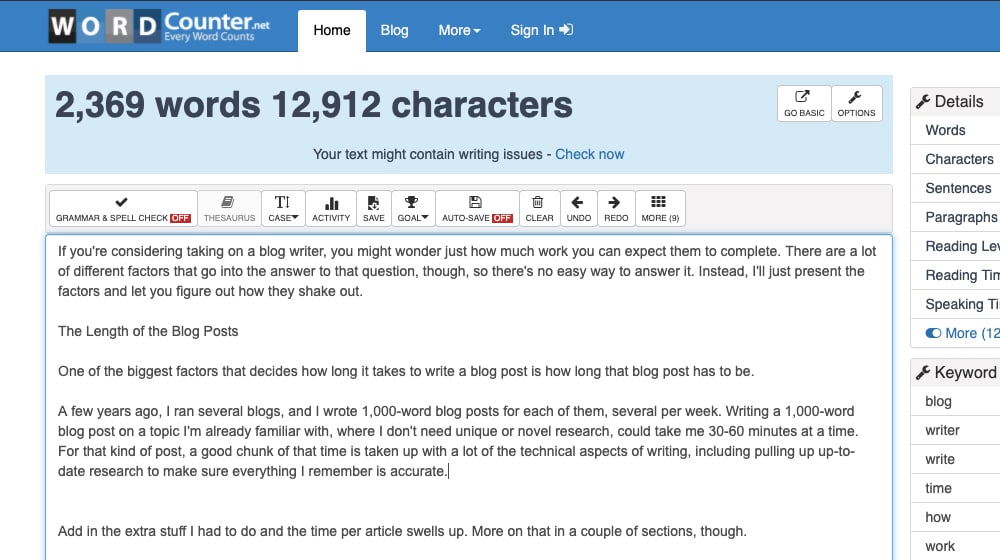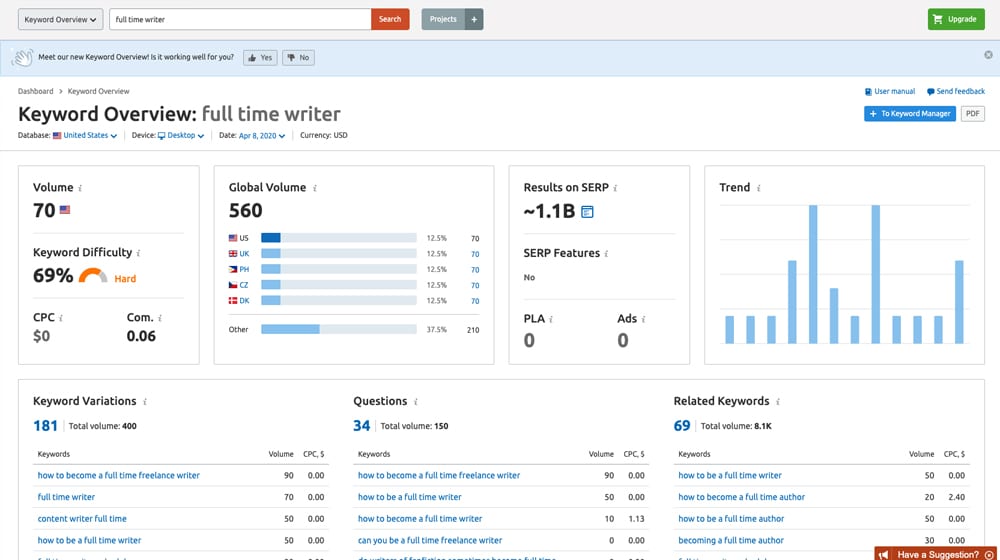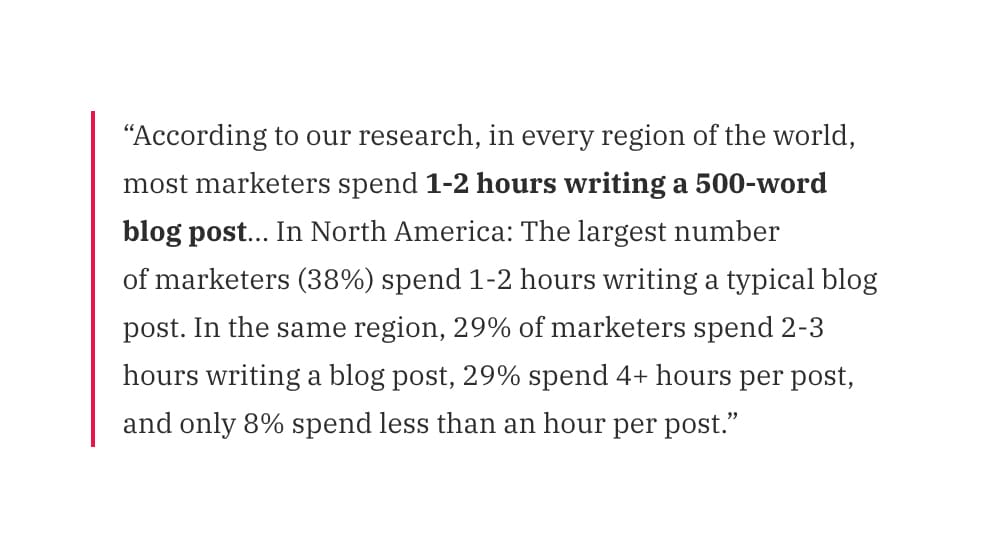How Many Blog Posts Can a Full Time Writer Produce?

If you're considering taking on a blog writer, you might wonder just how much work you can expect them to complete. There are a lot of different factors that go into the answer to that question, though, so there's no easy way to answer it. Instead, I'll just present the factors and let you figure out how they shake out.
 30 Second Summary
30 Second Summary
You'll find that a writer's output depends on several important factors. You have to think about the post length you want, since a 1,000-word post might take 30-60 minutes while a 2500-word post needs 60-90 minutes. You should also think about how much research each topic needs - familiar topics go much faster than new ones. If you need your writer to handle extras like keyword research, images, and formatting you'll need to add several more hours per post. Your budget matters too, since writers often prioritize higher-paying clients when managing their workload.
The Length of the Blog Posts
One of the biggest factors that decides how long it takes to write a blog post is how long that blog post has to be.
A few years ago, I ran several blogs, and I wrote 1,000-word blog posts for each of them, several per week. Writing a 1,000-word blog post on a topic I'm already familiar with, where I don't need unique or novel research, could take me 30-60 minutes at a time. For that kind of post, a good chunk of that time is taken up with a lot of the technical aspects of writing, including pulling up up-to-date research to make sure everything I remember is accurate.

Add in the extra stuff I had to do and the time per article swells up. More on that in a couple of sections, though.
These days, I write fewer posts per week, but the posts are longer. My typical blog posts are around 2,000-2,500 words long, and they can take me 60-90 minutes just to write, each. That, again, doesn't include extra stuff like keyword research, adding images, or formatting for the website itself.
If I were tasked with writing a bunch of 600-word blog posts, I could probably bust them out in 10-30 minutes each, depending on other factors. If I had to write a 5,000-word blog post or a 10,000-word eBook, it could take an entire day or longer.
I've found, anecdotally, that there's a "sweet spot" around 1,500-2,000 words. Shorter than that and I don't save much time on the writing, because I still have to do all the other stuff. Longer than that, and I start taking longer to write the post. Anything much longer than, oh, 2,500 words, requires a lot more work. At that point, unless it's a topic I'm very knowledgeable about and passionate about, I have to scrounge up additional side topics, conclusions, themes, and content to fill out the rest of the word count. This can take a surprising amount of time.
How Much Research is Necessary
I've written blog posts on a wide variety of topics over the course of my career, and I expect to cover many more before I'm done. I've written content on car buying, on health foods, on insurance, and of course on every possible facet of content marketing.
The more I already know about a subject, the easier it is to write about it.

That knowledge means a few things.
- I know roughly what would be considered common knowledge versus what needs explanation.
- I know the websites that are authorities within a niche, rather than SEO-fluffed but thin or off-topic sites.
- I know how to piece together elements of a topic to create a satisfying conclusion.
Sometimes when I go to write a blog post, I conduct "research" in the form of plugging a couple of keywords into Google and pulling up 5-10 of the more authoritative sources to reference. Other times, I have to do a bunch of ground-level reading about the topic to familiarize myself with it. This can take an hour or longer, depending on the depth of the topic and my level of familiarity with it.
This is why it can be important to hire several writers as part-time writers rather than one full-time writer. Taking on writers with different experiences and different backgrounds means you can put together a more robust skill set to draw from.
How Familiar the Writer is With the Topic
I mentioned this a bit above, but familiarity with a topic is really important for writing definitive articles. When I put together a blog post, I have to do a rough outline, and that's easier to do if I know enough about the topic to know how to guide a discussion through it.

Familiarity with a topic is important for every topic, but it's crucial for some. For example, I wouldn't want to write a blog post about a detailed medical topic without knowing a decent amount about it. The same goes for financial topics. I don't know my way through every facet of investment banking or venture capital or how the stock market works, so if I had to write about it, I'd want to take extra time to make sure I'm getting things right.
The more potential there is for my advice to mislead someone, either because my advice was wrong or because they didn't follow it properly because I didn't convey it properly, the more time it will take to research the topic, and the longer it will take to write any given blog post.
How Much Additional Stuff the Writer Has to Do
This one is, in part, where you draw the line between a blog writer and a blog manager. The ideal situation from a writer's point of view is being able to sit and write, without having to worry about the other stuff that goes into a blog. So what other stuff is there?

Here are some of the most common ones, just to name a few:
- Keyword research and topic ideation. All of my mentions of time up above are just the writing; you can add hours every week dedicated to just coming up with topics to write about. Some of this can be streamlined with tools, but a lot just comes down to building experience, and that takes time.
- Blog images. I make some images myself and I contract with a graphic artist to make others, but even coming up with the images I want to use takes some time. A lot of writers don't have any skill with graphics programs and would take even longer if they're asked to create images, even using a tool like Canva to speed it up.
- Links. I include links in my writing, and it's often as easy as linking to some of the pages I dub up for research as sources to cite. Sometimes I'll go through after the fact and find areas where a section could use a little more detail, and add a good link to it, which of course takes time.
- Formatting. I do some formatting as I write (to emphasize certain things and add in elements like bullet lists and subheadings), but I add in some additional formatting in a second pass which adds more time to the process. For example, bolding, italics, sub-headings, replacing some of the funky characters Microsoft Word generates, blockquotes, and code tags, to name a few.
- Post scheduling and management in the CMS. Obviously, I have to do this myself for my blog, but a writer might not have to. If you're hiring just a writer, you handle some of this for them, but if you're hiring a blog manager, they might do it.
- Meta tags. The meta description, meta title, and on-page SEO elements of a blog post are critically important for modern content marketing, but a writer might not want to spend their time doing it when they could be writing standard content instead. Again, it depends on what kind of requirements you have for your writer and what you want them to do. Metadata is also something that people who aren't SEO experts shouldn't be doing, as they can severely harm your SEO if done improperly.
- Plugin management. Have a caching plugin? You'll need to flush and rebuild your cache after posting. Do you use any special call-to-actions or custom fields? You'll need to know how to use those properly and input the correct variables so they display correctly. The list goes on; comments plugins, table of contents, related posts, broken link checking, redirecting / auditing / consolidating posts - knowing how your CMS works and correctly using your plugins requires a certain level of knowledge and experience.
All of this can add hours to the process it takes to create a single good blog post. When I can sit down and write a single blog post start to finish, I can crank one out in an hour. Maybe two if I want to put extra care into it. When I have to start from scratch with topic ideation and go all the way through scheduling it for publication, it might be four or five hours of work. There's a lot of variation there.
How Long You Consider Full Time
Here's another factor: what do you consider full time for a writer? Are you going with the traditional 40 hours a week definition? Are you calling any writer who writes for a living and doesn't have a day job a full-time writer? Is your definition even stricter with the requirements?
If you're talking about freelance writers, a lot of them will overestimate the amount of time it takes to get a given project done, specifically so that they have flexibility with deadlines and managing work from other clients. I'll mention more about that later, as well.

If your writer is working exclusively for you – though you can't really tell and you'd have to have them sign some kind of non-compete to enforce it – they might say they can get work done in two hours when it really takes them an hour, again because they want that flexibility. Even I will underestimate my own ability, intentionally, so that I have flexibility.
The most important reason writers do this is so that, if a sudden influx of work from another source comes in, they don't burn out or get overwhelmed. Alternatively, it's so they can manage other aspects of their lives without issues. For example, if they have children to care for and they work from home, anything from an accident to a school recital can throw a wrench into their regular schedule, such that they need their flexibility to manage it.
Regardless, the reason your definition of full-time matters is because the fewer hours in a week the writer has, the fewer pieces they'll produce in their "full time" role. If you're hiring them on as a salaried employee working 40 hours per week or whatever, however, much work they get done in those 40 hours is how much they can produce.
The Typing Speed of the Writer
A lot goes into writing, but at the most basic level, the writer has to actually write. The faster they are able to write, the faster they can get pieces done. I'm fortunate in that I have a relatively high WPM count (and you can test yours here), but I've known professional writers that blow me out of the water. I've also known professional writers who type under 40 words per minute. It varies wildly.

Typing quickly can reduce the amount of time it takes to write a post by a decent chunk, but all of the surrounding stuff a writer has to do – even just the research, proofreading, and managing communications with their clients – takes up more of their time.
The Writer's Compensation Level
It might sound a little pithy, but writers have to eat, right? So compensation matters. I know a lot of freelance writers, and I can tell you that many of them will prioritize work from their higher-paying sources. And really, why wouldn't you? If you have a limited number of hours in a day to work, you want to get the most out of those hours. If that means producing 10 articles for one client instead of 5 for them and 5 for another, cheaper client, then one client is going to see a writer with high productivity and the other is going to see an unavailable writer.

I know I've had a few cases where a tempting offer has led me to work more than I would otherwise work in a given week just to get that extra cash on hand. I've also known writers who compulsively push themselves to the brink every week, and wouldn't be able to accept more work even if they wanted to. It really varies from writer to writer here.
The Writer's Other Clients
Another factor to consider is how many other clients the writer has, and how much work those clients are given them, and how all of these other factors play into that work. A full-time writer for you might be able to write five blog posts per week, but it's entirely possible they are writing five blog posts per week for four different clients.
In order to get a writer to write for you full time with the full extent of their ability, you need to have enough work and enough pay to keep them working for you; enough that they don't go looking for something better. How much work you can offer them depends on the bandwidth of the writer, as well.
Anecdotal Data
All of this is a lot of variable information, so what kinds of actual examples can we find online? Let's see.

This Quora poster says she takes nearly an entire workday to write around 2-3K words, which would be about one to one and a half of my usual blog posts, or 2-4 blog posts of shorter lengths.
The data in this post from various writer surveys indicate it takes many writers 1-2 hours to write a 500-word blog post. That seems like way too much time to me, but then, not everyone has as much practice as I do, and they do say it's "marketers" and not "writers" specifically. Marketers often get distracted or have other things to do.
This fashion blogger mentions that they only write 1-2 in-depth posts per week, with as many as 9-10 posts per week in general. They also mention that writers they knew churn out as many as 6 posts per day.
What about you? Many of you reading this are blog writers, so tell me; how many posts, of what length, can you write in an average full-time work week?



 30 Second Summary
30 Second Summary



December 09, 2020
I actually prefer hiring a project-based or freelancer compared to a full-time writer. Based on my experience, I recently hired a full-time writer and agreed that he will submit 10 articles a week (2 articles daily with 1,500 words) unfortunately, it didn't turn out well as the articles submitted were all low quality. That's when I realized that there are times where writers are don't have creative juice and can't work on writing every day. So, what I did was I just pay him for 2 articles per week with 2,500 words per article. Quality picked up substantially.
December 11, 2020
Hey Steven!
I'm glad you found a system that is delivering results. Every business I've spoken with that has taken the quality-over-quantity approach has never gone back. Keep it up!
March 18, 2021
Great info. In the process of hiring and this gives me a decent baseline of what to expect. I don't want to ask my writer to do something unrealistic but I also don't want them sitting around twiddling their thumbs either... 😛
March 25, 2021
Hey Myrtle, happy to hear that! Glad it helped you and good luck on the search.
April 08, 2021
For 2,000 word posts, how many do you think a full-time writer can reasonably write?
April 14, 2021
Hey John!
It varies greatly on the writer. Some people just naturally work more slowly, and others get burned out if you put too much on their plate.
It could be anywhere from 5 posts per week to 15+ posts per week.
Seasoned writers with lots of experience researching, writing, and building outlines will be on the higher end of that range.
October 20, 2021
Great read! I am a full-time writer and I can finish at least 12 articles with a 1,500-word count weekly. What Steven said was true that some writers will have days when they'll feel unmotivated to write. I experience the same thing sometimes, so what I do is take a quick nap or play with my pets and after that, my vigor to write is back lol. I avoid forcing myself to write when I don't have the enthusiasm because the thing that scares me is to produce low-quality articles. My writings reflect who I am, after all!
October 20, 2021
Hey Hannah, thanks for the comment!
It's cool to get another writer's take.
The amount of content you produce sounds about right - anything more than that each week starts to get tricky, and the quality could begin degrading. Burnout is very real in the content marketing industry, and I feel it myself quite often. You have to force yourself to get out into nature or spend some time away from the computer. Otherwise, you'll end up spinning your wheels which doesn't benefit anybody!
November 30, 2021
This is very insightful and I agree that these factors definitely affect my writing process. There was actually a time that I was too confident with the deadlines I gave that I ended up cramming too much writing in one day. Everything turned out well, but since then, I've always made sure to overestimate the turnaround time just to be sure. It's comforting to know other writers do that, too.
December 01, 2021
Hey Jhonnatan!
That sounds all too familiar to myself and our writers - we try to get everything in a day early because things happen. Articles need rewriting, we'll discover new information that changes our goal, or some other roadblock comes up.
February 20, 2022
I used to try to reach 10 blog posts a week but found myself burning out pretty quickly. I switched to 3-5 posts a week and my output is significantly better and I'm less tired
February 21, 2022
Quality always beats quantity! I bet those 3-5 posts are better quality than the ten posts you were producing, so it's a win!